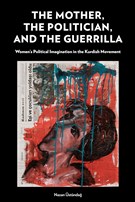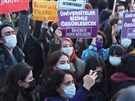Since the first days of the graft and corruption crisis, I have found myself thinking about a section from Haydar Darıcı’s masters thesis, completed under Leyla Neyzi’s supervision at Sabancı University. The thesis concerns itself with Kurdish kids incarcerated under the anti-terrorism regulations of 2006, otherwise known as stone-throwing kids (taş atan çocuklar). In interviews conducted in Adana, children between ages of ten to eighteen talked to Darıcı about their politicization, along with migration, repression, poverty, discrimination in the city and in the schools, and thousands more of their burdens; at some point, one of them said: “Adults do not understand what serious work politics is.” That quote has been a lesson I wear on my ear as a ring.
I am not one of those who turned blissful with the revelation of the corruption and graft crisis, smiling because the disaster called the AKP administration has now been exposed. On the contrary, I am, to put it in Sırrı Süreyya Önder’s terms, lost in thought (efkarlıyım) with the utter collapse of this cruelly oppressive administration. I cannot explain away all that has been exposed simply by Erdoğan’s villainy, dictatorial nature, and greed. I think, rather, that it is high time to approach Tayyip Erdoğan and the AKP as social phenomena, and think about what kind of a picture we are faced with and what kind of a Turkey we have been compliant with, going back well before AKP rule. After all, gangsterism (or “brigandage,” as the AKP calls the Gülen communities’ acts nowadays), states within states (deep and parallel), a media completely obedient to governmental demands, hatred, crime networks, alliances between capital and politics: the AKP has not introduced these things to Turkey. What kind of a new form the AKP administration has given to these relations, and the whys and hows of that particular form, constitute a topic to be carefully studied in its historical and global trajectories; this will not be dealt with here.
One thing is becoming increasingly clear: Erdoğan will not leave without a fierce and vicious fight. This is a grave and alarming situation. It could potentially pave a road to Damascus. With its Saddams, Qaddafis, and Assads, the Middle East, to put it crudely, is the common ground of those who fear what might happen to them if they were to leave, and who instead take their countries down with them. Let us set aside these disaster scenarios as well; instead, let us strive to envision the future with more hope.
As I have earlier suggested, Erdoğan and the AKP need to be approached as sociological phenomena, and hence it is of critical importance that we analyze what brought them to their current state. The past twelve years with Erdoğan and the AKP have been punctuated by dozens of anti-democratic executive orders and laws, incarcerations in their name and under their umbrella, and the ruination of cities and nature for greater profits in the service of the construction industry. Meanwhile, Turkey has been transformed into a cemetery of buildings, a detention center, a hell of unrighteousness and injustices, racism and discrimination, characterized by a mutually hate-filled polarization. Yet despite this constellation, the AKP consistently collected around fifty percent of the popular vote at the ballot box, and it has constructed itself as the addressee of hopes through methods we have frequently discussed. The AKP’s power has always been in its ability to keep people waiting with promises that democracy will one day be institutionalized, the country will be economically exemplary, and peace will ensue. Any attempt to explain and forget about these hopes that were invested in the AKP and celebrating the AKP’s demise by calling it immoral, unethical, and dirty will not take us further than adding yet another prime minister to Turkey’s cemetery of prime ministers.
The contemporary situation we find ourselves in is a structural issue, a problematic of a “system.” Waking up to news about large scale corruption and embezzlement at least once every ten years, and encountering those actors who disseminate documents when the tables are turned…those hasty decisions of war after dozens of state-level initiatives and “openings” to undertake peace talks in Turkey’s Kurdistan over a war that carries on into its thirtieth year…while massacres and lynching incidents continue to haunt us, Turkey’s surprising ability to leave any international crisis with diplomatic ineptitude and hostile animosity never disappoints…and the full-scale mortgaging of the country to the construction industry charged with the task of “transforming” its economic infrastructures every decade through the invention of new regimes of indebtedness. Are these only of the AKP’s making? Or are these Turkey’s fate and destiny? And how to break out of this vicious cycle?
We have a very difficult Turkey at hand these days. In one corner are those in a state of terrifying insecurity, lost in worrisome deliberations over whether or not these tapes record things that really happened, but also wary of resurrections of the past: the Kemalist strike-back and instability, crashes and poverty. In another corner, we find an alliance of capital, politics, and media, sinking deeper and deeper every day into the quicksand that they themselves constructed. In yet another corner are the edgy and impatient Kemalists dedicated to resurrecting their former pre-eminence by declaring the AKP guilty. The down-and-dirty gangsters of the 1990s who made ends meet through their crime networks and their racism are being released from prison one by one. In a much less examined corner, we find the extremely concerned and anxious Alevis of Turkey. And last but not least, there are the Kurds who have been waiting for a peace process that will meet international standards to start for a year now. Tired of discrimination and marginalization, many of them are inclined to lose all hope in Turkey.
In her article entitled "Politics and Lies," Zeynep Gambetti charts out the increasingly surreal qualities of Turkey’s century-old regime of lies, denial, corruption, and animosity on an analytical axis of political philosophy; she also hints at some clues leading to the possibility of a way out. I am of the opinion that we could only realize that possible way out through a regime of direct democracy: one that would render a regime of secrets and lies unworkable. I am also of the conviction that the constitution of a regime of peace whereby we could share our truths and suffering with one another and engage in a genuine discussion, a regime of thorough democratization that by design does not allow for the consolidation of power in monopolies, is the only way out for us.
Because I approach the AKP as a sociological problematic and because I believe that Turkey’s century-old fate could change, I am with the HDP (People’s Democracy Party). Because of the HDP’s call for peace and for genuine transparency, I am with the HDP. Because of the HDP’s proposal to build state budgets with people’s participation that will in turn structurally render such corruption and graft schemes unworkable, and because they have structured governance around people’s councils whereby people make the decisions that will affect their lives, I am with the HDP. I am with the HDP, because they present a social analysis and concrete proposals for social transformation, when they call for the Erdoğan administration’s resignation and immediate early general elections. Because the HDP has carved out a space for those left empty-handed by Kemalism, neoliberalism, and nationalism, because in so doing they generated an archive of experiences and ideas for a political alternative, and because they did so by achieving a fifty-percent representation of women, I am with the HDP. Because their members screamed the pride slogan “yet we are fags!,” because of their providing twenty-percent representations to youth and ten percent to the LGBTI and queer folks in their local councils, and because the HDP recognizes the rights and addresses the grievances of Kurds, Alevis, Armenians, Greeks, and Jews in Turkey, I am with the HDP. Because the HDP has taken the constitution of truth and reconciliation in Turkey as the centerpiece of its municipal election campaign declaration, I am with the HDP. I am with the HDP because of the party’s commitment to public services and to the commons, the public spaces where we live and produce together. I am with the HDP because they are as committed to the right to water and the right to nature as they are to human rights. I am with the HDP because it feeds off of all anti-capitalist movements across the globe, because it is invested in Turkey’s future, and because the movement has declared clearly how they will break out of the AKP’s and Turkey’s structural cycle. Because they seem worthy of trust, I am with the HDP.
I don’t expect everyone to join the ranks of the Peoples’ Democracy Party. What I expect is rather a promise of democratization and a commitment to peace negotiations in today’s Turkey. These are days when we are not at all that far away from a domestic war, with all forms and shapes of totalitarianism, and their attendant regimes and strategies of managing and governing through revenge and grudges. I take politics very seriously. And one day in not so distant future, I want to wake up to beautiful days. I really can no longer laugh at Bilal and Tayyip Erdoğan after some point. I cannot forget the grim days of the 1990s, any more than I can forget the millions stolen under the current regime. I cannot forget the death fasts of the 1990s any more than the hunger strikes of 2012. I cannot forget the summer of 2012 and its war. I cannot forget the shipyard workers who systematically died throughout the 2000s due to the lack of security standards. Neither can I forget the acid wells, where dozens of members of the Kurdish opposition disappeared. I cannot forget those incarcerated in connection with KCK. And I cannot forget the kids, either those who work in textile workshops tucked under the staircases of buildings or those who throw stones and rot in imprisonment in juvenile detention centers. I cannot forget Roboski. Ali Ismail, Berkin. I can’t forget. Yet I also cannot forget Savas Buldan and Vedat Aydin, who were killed extra-judicially under the rule of the DYP. I expect everyone to set aside the tapes and the curses and everything else in between. Instead, having taken off and lowered their hats and having found their own earrings of wisdom, I expect everyone to engage seriously with this century-old cycle of destruction. I expect everyone to say “enough!” to discrimination and alienation, sexual and gender inequalities, secrets, closed doors, dirty alliances, monopolies, job insecurity, lies and monkey business, war and deregulation. I hope for everyone in Turkey to take this graft and corruption disgrace as an opportunity to imagine a different possibility.
[This article was first published in T24 on 1 March 2014; the original version can be found here. It was translated from the Turkish by Emrah Yildiz.]
![[Image via bianet.org]](https://kms.jadaliyya.com/Images/357x383xo/HDP_bianet.jpg)





